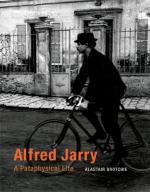|
This section contains 7,774 words (approx. 26 pages at 300 words per page) |

|
SOURCE: Cutshall, J. A. “‘Celui Qui Dreyfuse’: Alfred Jarry and the Dreyfus Case.” Symposium: A Quarterly Journal in Modern Foreign Literatures 43, no. 1 (spring 1989): 20-36.
In the following essay, Cutshall examines the ways in which Jarry's journalism, plays, and novels commented upon the Dreyfus Affair and the ensuing scandal.
Alfred Jarry (1873-1907) reached his maturity as a writer during the 1890s, a time of considerable political polarization in France when authors, whether of fiction, journalism, or both, as was the case with Jarry, were accustomed to being embroiled in questions of society and politics. If this was most obviously true of Emile Zola and his imitators, the socially and often socialist-orientated naturalist authors on one hand, and on the other of ultra-rightwingers like Edouard Drumont and Maurice Barrès, then it was in certain respects no less true of the Belle Epoque's more avant-garde writers, although this fact...
|
This section contains 7,774 words (approx. 26 pages at 300 words per page) |

|


